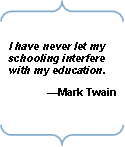- NJASA
- Executive Message - Oct/Nov 2013
-
Do Evaluation Reforms Contribute to 21st Century Learning?
Most people with whom I speak envision the future of education differently from that of the past. The influence of technology in the learning environment and its potential to personalize learning are cited as “game changers” by many. Conversations by educators envision a learning environment increasingly at the control of the student with technology providing “just in time” delivery at the individual’s level of learning.
We are seeing a dramatic shift toward this use of technology-based instructional resources. Digital materials are making
 their way into classrooms to support instruction and as replacements for textbooks. Blended learning courses combining traditional and digital learning opportunities are expanding. We are seeing an explosion of online learning opportunities including archived video lessons such as Khan Academy and MOOC’s (Massive Open Online Courses) aimed at interactive participation and open access on the web. Student access to educational materials on their tablets and smart phones is growing, making knowledge available outside the brick and mortar schoolhouse and accessible when students want it.
their way into classrooms to support instruction and as replacements for textbooks. Blended learning courses combining traditional and digital learning opportunities are expanding. We are seeing an explosion of online learning opportunities including archived video lessons such as Khan Academy and MOOC’s (Massive Open Online Courses) aimed at interactive participation and open access on the web. Student access to educational materials on their tablets and smart phones is growing, making knowledge available outside the brick and mortar schoolhouse and accessible when students want it. All these developments raise an interesting question about educator evaluation reforms. Are educator evaluation models which focus on traditional teaching and student outcomes on standardized assessments misaligned with the evolving role of teachers and 21st century learners? Perhaps a more appropriate question might be: “To what degree might the reliance on these indicators of teacher effectiveness be counterproductive?”
Ian Jukes, Director of the InfoSavvy Group and frequent NJASA TECHSPO keynote speaker, talks about educators needing to be an educational quarterback. What does he mean by that? The quarterback doesn’t throw the football to where the receiver is at the start of the play, but down the field where he anticipates the player will be. Educators need to “look down the technology field” and anticipate how the role and practice of educators will change in order to develop the resources and strategies for transforming, not reforming, our practice. If teacher effectiveness is judged on an increasingly outmoded model, and we track that performance to settle on compensation, determine job retention, and judge teacher preparation programs at the college level; are we impeding the progress that we need to ultimately make to prepare students for their future?
We shall be soliciting feedback from members about the implementation of NJ Achieve during the year to better learn about the resources and support needed by practitioners to ensure success for their students. We shall do that with an eye toward the shifting roles of educators as we develop recommendations for the evaluation of their future work.
NJASA is energetically examining schooling and educational resources for the future. Here are some of our initiatives:
- The Vision 2020 Committee is defining a vision for New Jersey public education and has recently surveyed members for input to that vision.
- NJASA has joined with K12 Aventa Learning to provide online learning opportunities for students (follow this link for the New Jersey Online Learning Services).
- NJASA is delivering and archiving free webinars focusing on the subject of online learning (follow this link for information and registration)
- NJASA will continue its leadership in technology and education with the sponsorship of TECHSPO 2014, the state’s biggest and best technology conference and exhibition (follow this link for TECHSPO information).
NJASA leaders, staff and volunteers work daily to ensure a superior statewide system of education and to maximize the capacity and effectiveness of school leaders through professional development programs and support services, both today and for tomorrow.



